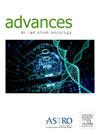Survival Benefit of Combined Chemoimmunotherapy and Radiation Therapy in Patients with Recurrent or Metastatic Esophageal Cancer
IF 2.7
Q3 ONCOLOGY
引用次数: 0
Abstract
Purpose
Chemotherapy combined with immune checkpoint inhibitors (ICIs) has become the standard first-line treatment for recurrent or metastatic esophageal cancer, but its efficacy remains suboptimal. This study aimed to evaluate whether the addition of radiation therapy (RT) to ICIs can improve patients’ survival.
Methods and Materials
This retrospective cohort study analyzed clinical data from 178 patients with recurrent or metastatic esophageal cancer who were treated at the First Affiliated Hospital of USTC between December 2019 and October 2023. Based on their actual treatment regimens, patients were stratified into 2 groups: the chemoimmunotherapy-alone group (ICIs group) and the chemoimmunotherapy combined with RT group (ICIs + RT group). To minimize selection bias, propensity score matching was used to balance baseline characteristics between the groups before comparative analysis. The primary endpoint was overall survival, and the secondary endpoints were progression-free survival and safety.
Results
After propensity score matching, 128 patients were selected for the final analysis, with 64 patients in the ICIs + RT group and 64 patients in the ICIs group. The median follow-up time was 11.26 months (95% CI, 7.02-15.32). The median overall survival was 23.71 months in the ICIs + RT group and 13.00 months in the ICIs group (hazard ratio, 0.53; 95% CI, 0.31-0.88; P = .013). The median progression-free survival was 10.43 months in the ICIs + RT group and 7.27 months in the ICIs group (hazard ratio, 0.61; 95% CI, 0.39-0.94; P = .024). Combination of chemoimmunotherapy and RT was safe and tolerable. No treatment-related deaths occurred in either group.
Conclusions
Adding RT can significantly improve survival in patients with recurrent or metastatic esophageal cancer who are treated with chemoimmunotherapy, but further prospective trials are needed for validation.
化疗与放疗联合治疗食管癌复发或转移患者的生存获益
目的:血液疗法联合免疫检查点抑制剂(ICIs)已成为复发或转移性食管癌的标准一线治疗方法,但其疗效仍不理想。本研究旨在评估在ICIs基础上增加放射治疗(RT)是否能提高患者的生存率。方法与材料本回顾性队列研究分析了2019年12月至2023年10月在中国科学技术大学第一附属医院治疗的178例复发或转移性食管癌患者的临床资料。根据患者的实际治疗方案,将患者分为单独化疗免疫治疗组(ICIs组)和化疗免疫治疗联合RT组(ICIs + RT组)。为了尽量减少选择偏差,在比较分析之前,使用倾向评分匹配来平衡各组之间的基线特征。主要终点是总生存期,次要终点是无进展生存期和安全性。结果经倾向评分匹配后,最终选择128例患者进行分析,其中ICIs + RT组64例,ICIs组64例。中位随访时间为11.26个月(95% CI, 7.02-15.32)。ICIs + RT组的中位总生存期为23.71个月,ICIs组的中位总生存期为13.00个月(风险比0.53;95% CI, 0.31-0.88; P = 0.013)。ICIs + RT组的中位无进展生存期为10.43个月,ICIs组的中位无进展生存期为7.27个月(风险比为0.61;95% CI, 0.39-0.94; P = 0.024)。化疗免疫联合放疗安全、耐受。两组均未发生治疗相关死亡。结论放疗可显著提高食管癌复发或转移患者化疗免疫治疗的生存率,但需要进一步的前瞻性试验来验证。
本文章由计算机程序翻译,如有差异,请以英文原文为准。
求助全文
约1分钟内获得全文
求助全文
来源期刊

Advances in Radiation Oncology
Medicine-Radiology, Nuclear Medicine and Imaging
CiteScore
4.60
自引率
4.30%
发文量
208
审稿时长
98 days
期刊介绍:
The purpose of Advances is to provide information for clinicians who use radiation therapy by publishing: Clinical trial reports and reanalyses. Basic science original reports. Manuscripts examining health services research, comparative and cost effectiveness research, and systematic reviews. Case reports documenting unusual problems and solutions. High quality multi and single institutional series, as well as other novel retrospective hypothesis generating series. Timely critical reviews on important topics in radiation oncology, such as side effects. Articles reporting the natural history of disease and patterns of failure, particularly as they relate to treatment volume delineation. Articles on safety and quality in radiation therapy. Essays on clinical experience. Articles on practice transformation in radiation oncology, in particular: Aspects of health policy that may impact the future practice of radiation oncology. How information technology, such as data analytics and systems innovations, will change radiation oncology practice. Articles on imaging as they relate to radiation therapy treatment.
 求助内容:
求助内容: 应助结果提醒方式:
应助结果提醒方式:


